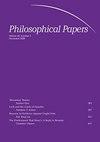引言:21世纪的公共和私人干扰
IF 1.3
3区 哲学
0 PHILOSOPHY
引用次数: 0
摘要
2020年2019冠状病毒病的到来给我们的公共生活和私人生活带来了严重的破坏,也打破了我们之前认为理所当然的两者之间的正常规范界限,尽管它们已经承受了压力。在我们生活的大部分领域,我们中的许多人都急于退出公共的、身体上的人际交往,局限于工作,从私人空间进行在线社交。这种由传染病造成的私人撤退是由激烈的公共干预造成的,给国家财政和私营经济活动造成了严重压力,并损害了无数私营企业,而最富有的少数人的私人财富却飙升。自2008年金融危机以来,发达国家政府向自由市场投放了数不清的数十亿美元,通过不同寻常的财政刺激措施刺激经济复苏,救助金融机构,收购有毒资产,敦促实现创纪录的低利率,现在又发布了流行病缓解措施。与此同时,随着气候危机的严重影响开始升温,极端天气模式已经在世界许多地区造成了火灾或洪水,然而,在2021年联合国气候变化大会上,各国几乎没有就限制以环境福祉为代价的有害私人牟利达成一致。上世纪80年代,罗纳德•里根(Ronald Reagan)温和地向美国工薪阶层和中产阶级的家庭价值观提出了将私人财富标榜为公共产品的理念本文章由计算机程序翻译,如有差异,请以英文原文为准。
Introduction: Public and Private Disruption in the Twenty-First Century
The arrival of Covid-19 in 2020 brought severe disruption to our public and our private lives, and also to ordinary normative boundaries we maintain between the two which we had previously taken for granted, although they were already taking strain. In most areas of our lives, many of us were hastened to retreat from public, physical interpersonal interaction, confined to work and to socialize online from private spaces. This private retreat forced by communicable disease has been imposed by drastic public intervention, putting a severe strain on state finances and private economic activity, and harming innumerable private businesses, while the private wealth of the wealthiest few has soared. Since the 2008 financial crisis, rich governments have unloaded untold billions on the free market, stimulating recovery with unusual fiscal stimulus measures bailing out financial institutions, buying up toxic assets, urging record low interest rates, and now issuing pandemic relief measures. At the same time, extreme weather patterns have burned or flooded many parts of the world as critical effects of the climate crisis begin to heat up, yet states at the 2021 UN Climate Change Conference agreed on few curbs to the harmful private profit-making that costs environmental wellbeing. The branding of private wealth as a public good, which Ronald Reagan introduced with modest appeal to the family values of workingand middleclass American citizens in the 1980s, ultimately came to be represented by
求助全文
通过发布文献求助,成功后即可免费获取论文全文。
去求助
来源期刊

Philosophical Papers
PHILOSOPHY-
CiteScore
2.10
自引率
0.00%
发文量
18
期刊介绍:
Philosophical Papers is an international, generalist journal of philosophy edited in South Africa Original Articles: Articles appearing in regular issues are original, high-quality, and stand-alone, and are written for the general professional philosopher. Submissions are welcome in any area of philosophy and undergo a process of peer review based on initial editor screening and refereeing by (usually) two referees. Special Issues: Topic-based special issues are comprised of both invited and submitted papers selected by guest editors. Recent special issues have included ''Philosophy''s Therapeutic Potential'' (2014, editor Dylan Futter); ''Aging and the Elderly'' (2012, editors Tom Martin and Samantha Vice); ''The Problem of the Criterion'' (2011, editor Mark Nelson); ''Retributive Emotions'' (2010, editor Lucy Allais); ‘Rape and its Meaning/s’ (2009, editor Louise du Toit). Calls for papers for upcoming special issues can be found here. Ideas for future special issues are welcome.
 求助内容:
求助内容: 应助结果提醒方式:
应助结果提醒方式:


